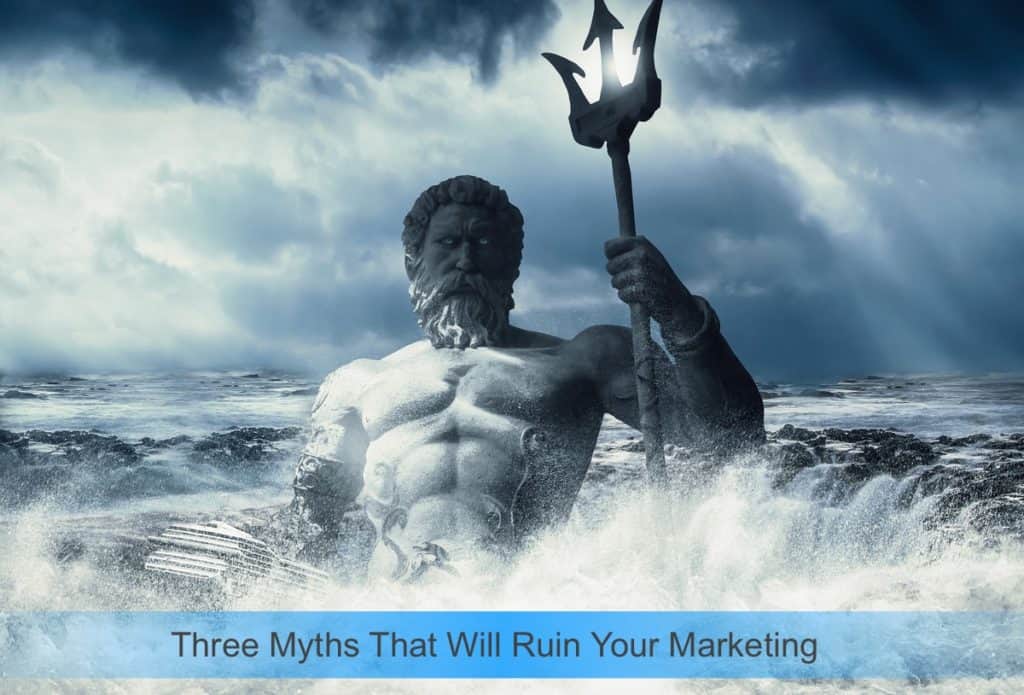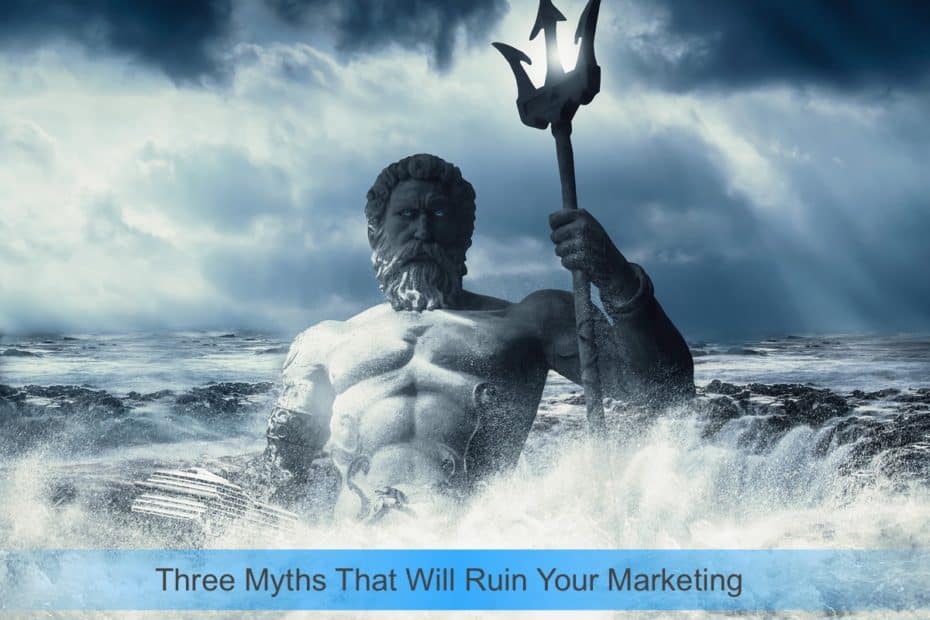
If search the internet long enough, you will likely discover all sorts of marketing myths.
Marketing myths are easy to fall for because on the surface they seem to make sense. Dig a little deeper and you’ll find that what you’re being told is either incomplete or doesn’t make complete sense.
Inside every marketing myth is something that speaks to your prior experiences in some way. They appeal to the way you wish things were or can be. In other words, they speak to your hopes and dreams.
The issue with these myths is that they are traps that can cause problems with your marketing. They can pull money and resources away from real options that will produce the results you want.
I don’t like seeing anybody get caught up in something that isn’t going to get them where they want to be and so today I am going to talk about three marketing myths that I see fairly consistently when talking with customers and prospects.
Marketing Is All About Creating Awareness
I’ve talked about awareness on more than one occasion. I continue to talk about it because it’s still one of the biggest myths I come across. If I made a dime every time I talked with somebody and their only marketing concern was building awareness, I’d retire a very rich man.
First, let’s acknowledge the obvious. Awareness is important. Without awareness, you would never sell anything. People have to know about you and your product.
Think of awareness like fame. If you have never heard of Taylor Swift, would you buy her music? How about Van Halen or The Beatles?
I could play this out over anything. Music, movies, books, magazines, newspapers, blog sites, hardware companies, software companies, insurance companies, health care providers. If you don’t know about it, you won’t spend money on it.
This is why so many of the prospects I speak with are obsessed with awareness.
What often gets missed is awareness is what it says it is: awareness. Just because somebody is aware of you doesn’t mean that they will consider buying from you.
For example, I’m well aware of Budweiser. The marketing is fantastic. The commercials never fail to entertain but I don’t buy Budweiser. I drink beer on occasion but I don’t like Budweiser.
Second, not all awareness is the same.
Budweiser is a mass-market example but everything doesn’t have mass-market appeal. Let’s look at an example on a smaller scale.
Let’s say you are an office manager at a doctor’s office. The doctor is a specialist in plastic surgery. There are many people that would consider plastic surgery for a host of reasons but it doesn’t matter if your prospective customers are aware of the plastic surgeon. If they don’t have a problem that a plastic surgeon solves, they will never be a customer.
Every buyer’s journey starts with awareness but it doesn’t end with it. In other words, awareness alone doesn’t pay the bills.
If your marketing goal starts and ends with awareness you are going to have a heck of a time staying in business.
Awareness is important but it is only one step of a longer journey.
You Need to be Everywhere
This is a myth that I’ve fallen into myself. In order to be a good marketer, you need to be everywhere.
Like awareness, this one seems to make sense on the surface.
The logic is this, you need to be everywhere to make it inevitable that people are going to find you. It makes sense yet it’s impractical.
If you are trying to be everywhere this is a sample of the channels you would need to engage in on a regular basis:
- Messenger
- Snapchat
- TikTok
- YouTube
- Vimeo
- Tumblr
- Quora
There are two immediate issues that you’ve likely already noticed. First, how are you going to be on all these channels in a meaningful way?
Unless you have a big staff and marketing budget, the answer is that you’re not going to be able to be on these channels in a meaningful way. In turn, this is going cause many more problems than it’s going to solve.
Second, and I argue the most important is, are your customers on all these channels?
The problem with being everywhere is it assumes your audience is everywhere too. Trying to be everywhere is an admission you have no idea where your audience is at.
If you’re a B2B company, is a shared media channel like Pinterest going to be the best channel for you?
If you are selling an air purification product where do you think you might have the best luck selling your services? A conference for accountants or a conference on environmental technology?
Do some research to find out where your audience is and invest in that channel. If they are on more than one channel, pick one and get really good at it. Then you can think about adding another channel.
The goal isn’t to be everywhere but to be in the best place to reach your audience.
The Best Marketing Goes Viral
You’ve likely at least heard of the TikTok video in which a gentleman is skateboarding down the highway while drinking Ocean Spray with Fleetwood Mac’s song “Dreams” playing over the top of it.
The song and the album its on, Rumors, has seen a nice increase in sales and streams. In fact, Rumors has made back into Billboard’s Top Ten for the first time in over 40 years.
The video’s s creator, Nathan Apodaca (420doggface208 on TikTok) was given a truck by Ocean Spray.
There have been countless imitations of his video at this point including takes by Fleetwood Mac members Stevie Nicks and Mick Fleetwood.
The video has become a viral sensation.
People see something like this and think, “If I could just go viral. I’d get a ton of attention and my sales would go through the roof.”
I’ve seen many articles about creating viral content claiming that there is a formula that anybody can employ. Follow the steps and you’ll go viral too while claiming the rewards that come with it.
The problem is, there is no formula. If there was, everybody would be going viral. But, everybody isn’t going viral which should tell you something.
Mainly, it’s really hard to go viral. It’s the exception, not the rule.
Virality also has the issue that its short term. The impact won’t last long. In the music industry, they call these one-hit wonders. An artist has a big hit and then disappears.
You don’t want your marketing to be a one-hit-wonder.
A better way to look at marketing is as an investment. You’re investing money now to get a bigger return later.
Having a video or tweet go viral is nice but it’s not going to provide the same return as email marketing or better yet, integrated marketing.
Planning and executing a strategic marketing plan may not be as sexy as going viral but it will provide better results and more consistent results.
Marketing myths can be appealing but you should avoid them at all costs. Like a siren, they will give you the illusion that you are moving in the right direction but you will ultimately wind up on the rocks.
*Image by intographics from Pixabay
- Is Your Marketing Connected? - March 6, 2025
- Stop Planning and Start Strategizing - October 24, 2024
- The Importance of Creating a Connection With Your Marketing - June 6, 2024

